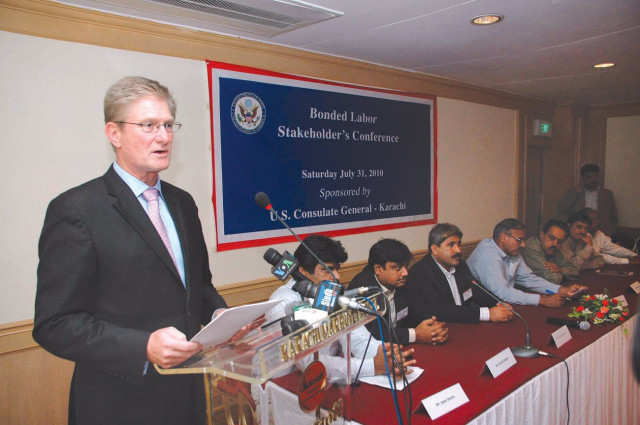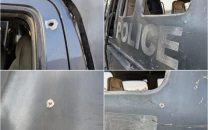‘Don’t cover the guns, cover the people in war’

Ricchiardi, who is also a journalist and was in the Balkans during the civil war, is visiting Pakistan.
She has been accompanied by her photographer friend, Frank Folwell. He has covered conflicts for USA TODAY in the Balkans and Somalia. In 1991, he traveled through the former Soviet Union with reporter Judy Keen, documenting the aftermath of the August coup.
The duo visited Islamabad and Lahore and delivered lectures to reporters at training workshops and visited different schools of journalism, last week. They are now in Karachi to do the same job. Both of them are experts in covering conflict across the globe. They witnessed what actually happened in Yugoslavia. “No one actually knew at that time what would happen in two hours,” recalled Ricchiardi. According to Folwell, it was one of the tougher tasks to cover as a photographer, as they did not know what would happen and when.
Both of them were not really interested in covering what one side claimed or the other. They prefered to stay focused on the humans who suffered. “Journalists have changed how the world looks at war,” said Folwell.
His stance is backed by Ricchiardi who felt that: “Reporting is effective only when you tell humans about the sufferings of other human beings. When you just talk about the military then the words do not bear the importance.”
Military defeats and advancements should be given coverage but the concentration should be on the human side of the story. When in the Balkans they would go to the refugee camps of displaced Bosnians. “I was impressed by the Bosnian Muslim refugees,” said Ricchiardi. “I would visit their camps and roam about and meet families and some of them would invite me into their tents.” At times when they were short of food they would still offer her apricots and cookies.
The duo said that they were really impressed with the journalists of Pakistan. “We were at the hotel and heard the explosions in Lahore and switched on the TV channels immediately,” said Ricchiardi, adding that they were taken aback by the coverage. “They were actually on the spot and one person sacrificed his life,” said Folwell.
They advised Pakistani journalists to be in contact with all stakeholders in a conflict but to also make sure that they know the political and ideological affiliations of their sources.
“Tell what is true to your readers. If there is the need, when quoting someone, tell them about his affiliations,” urged Ricchiardi. Folwell added that a journalist should know what is the purpose for someone to be sharing information. “People use journalists and good journalists always bring in a delicate balance to their news.”
Both of them agreed that opinions should be solicited from all parties even though some of them would not be happy wtih the report. “In Europe, it is said, ‘If I am reporting and love it, then I am not doing my job’,” quipped Ricchiardi.
They did notice and were unhappy about the fact that there wasn’t enough safety training and equipment for Pakistani journalists. At times a little knowledge can save lives.
Published in the Express Tribune, June 2nd, 2010.



















COMMENTS
Comments are moderated and generally will be posted if they are on-topic and not abusive.
For more information, please see our Comments FAQ